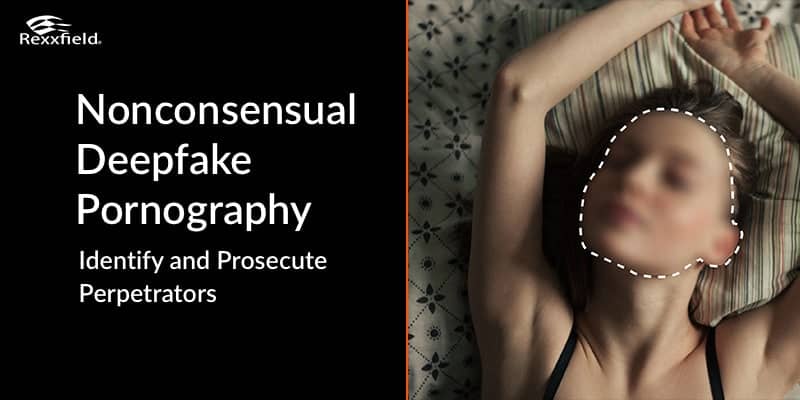New Research Finds 96% of Deepfakes Are Pornographic – As of 2019, 96% of deepfakes on the internet were nonconsensual deepfake pornography, according to an analysis by AI firm DeepTrace Technologies, and virtually all pornographic deepfakes depicted women. We support victims of nonconsensual deepfake pornography and identify perpetrators in order to get prosecution.
The Role of Cyber Investigations Combating Nonconsensual Deepfake Pornography
Nonconsensual deepfake pornography is a disturbing trend that has gained widespread attention in recent years. Deepfakes are manipulated images or videos that use artificial intelligence to superimpose the face of one person onto another’s body. While deepfakes can be used for benign purposes such as entertainment or satire, they can also be used for malicious purposes such as revenge porn, sexual blackmail, or propaganda.
Nonconsensual deepfake pornography involves the creation and distribution of sexually explicit images or videos that feature the likeness of a person without their consent. Bad actors can create these images or videos using photos or videos of the victim obtained through social media or other sources. They superimpose the face of the victim onto the body of an actor or actress performing sexual acts.
The consequences of nonconsensual deepfake pornography can be devastating for the victim. Bad actors may use the images or videos to harass, embarrass, or extort the victim. They can also damage the victim’s reputation and lead to social stigma, job loss, or even suicide.

In July 2019, lawmakers in Virginia passed a law criminalizing the non-consensual sharing of Deepfake pornography.
Individuals can take several measures to combat nonconsensual deepfake pornography. First, individuals can protect themselves by limiting the amount of personal information they share online and being cautious about whom they share intimate images or videos with. Second, technology companies can develop tools to detect and remove deepfakes from the internet. Third, governments can enact laws that criminalize the creation and distribution of nonconsensual deepfake pornography and provide resources for victims to seek legal recourse.
In conclusion, nonconsensual deepfake pornography is a disturbing trend that poses serious legal and ethical challenges. While there is no simple solution to this problem, it is important for individuals, technology companies, and governments to work together to prevent the creation and distribution of nonconsensual deepfake pornography and protect the rights and dignity of the victims.
Victims of Nonconsensual Deepfake Pornography Help & Investigation
Nonconsensual deepfake pornography is a serious issue that can have a devastating impact on the victims. If you or someone you know has become a victim of nonconsensual deepfake pornography, there are several steps that you can take to seek help and support.
Contact Law Enforcement
The first step for victims of nonconsensual deepfake pornography is to contact law enforcement. Depending on where you live, there may be specific laws that you can reference to prosecute the perpetrator. Some countries have enacted laws that specifically address deepfakes. Others have laws that can be applied to revenge porn or cyberstalking, which can also cover deepfakes.
It is important to provide as much information as possible to law enforcement. This includes any evidence you have of the deepfake and any information you have about the person who created or distributed it. This can include screenshots of the deepfake, messages or emails you received from the perpetrator, and any other relevant information.
Contact Cyber Investigators
Our investigators can trace the person responsible for distributing the deepfake material. We can also trace the owners of websites posting deepfake porn. This allows victims and law enforcement to prosecute the bad actors in court for removal of the material as well as legal damages.
We have an 80%-90% success rate for tracing IP addresses for anonymous online users. In most cases, we can gather much more evidence than the IP address. This leads to the identification of the individual behind unlawful or harassing internet activities.
Seek Legal Recourse
Victims of nonconsensual deepfake pornography may also consider seeking legal recourse. This can include filing a civil lawsuit against the perpetrator for damages, including emotional distress and loss of reputation. A lawyer who specializes in revenge porn or privacy law can provide guidance on the legal options available. Later in this article, we’ll explain more about the legal damages that are available to victims of nonconsensual deepfake pornography.
Seek Counselling
The emotional impact of nonconsensual deepfake pornography can be significant, and victims may benefit from seeking counselling or therapy. A mental health professional can provide support and guidance for coping with the trauma and emotional distress caused by the deepfake.
Report the Deepfake
Victims of nonconsensual deepfake pornography can also report the deepfake to the website or social media platform where it was posted. Many websites have policies that prohibit the posting of nonconsensual deepfake pornography. If the content is reported, they may remove it.
Take Steps to Protect Your Privacy
Finally, victims of nonconsensual deepfake pornography may want to take steps to protect their privacy. This can include removing personal information from social media and other online platforms. Also, using privacy settings to limit access to personal information and being cautious about sharing intimate images or videos.
Legal Damages Available to Victims of Nonconsensual Deepfake Pornography in Court
If a victim of nonconsensual deepfake pornography decides to pursue legal action, there are several types of damages that they can seek in court. These damages can vary depending on the jurisdiction and the specific circumstances of the case, but may include:
Compensatory Damages: These damages are intended to compensate the victim for any harm or losses they have suffered as a result of the deepfake pornography. This can include damages for emotional distress, humiliation, and damage to reputation.
Punitive Damages: In some cases, the court may award punitive damages. They intend to use these to punish the perpetrator for their conduct and deter others from engaging in similar behaviour.
Injunctive Relief: This type of relief is intended to stop the perpetrator from continuing to distribute or create the deepfake pornography. This can include court orders to remove the deepfake from websites or social media platforms, as well as orders to prevent the perpetrator from creating or distributing similar content in the future.
Attorney’s Fees: In some cases, the court may award attorney’s fees to the victim if they prevail in their lawsuit. This can help to offset the cost of legal fees and make it easier for victims to pursue legal action.
It’s important to note that the damages that a victim can recover in a deepfake pornography case can vary depending on the specific laws in their jurisdiction and the circumstances of their case. An experienced attorney can help victims to understand their legal options and pursue the appropriate damages in court.
Help me identify the perpetrator so I can sue for legal damages


